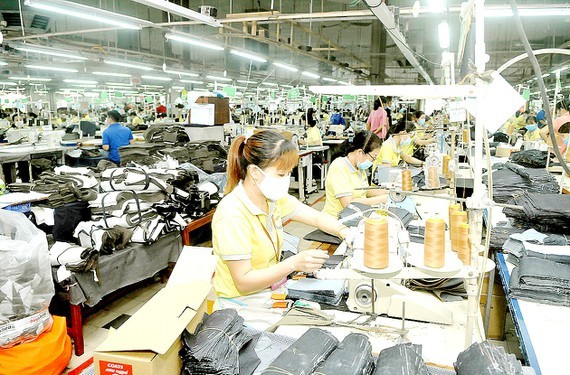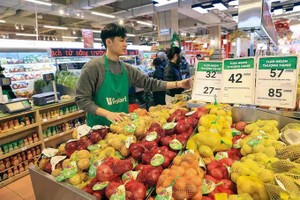 Garment production at Phong Phu Corporation in Thu Duc City. (Photo: SGGP)
Garment production at Phong Phu Corporation in Thu Duc City. (Photo: SGGP)
An avalanche of orders
According to the Vietnam Trade Promotion Agency under the Ministry of Industry and Trade, since April, orders sent by foreign enterprises to the agency to find sources of supply from Vietnamese enterprises have increased sharply, with the most orders coming from the US, China, Thailand, and Russia.
Specifically, through the Trade Promotion Agency, the US Bridgepathway LLC has been searching for Vietnamese enterprises, capable of supplying processed foods and confectionery products. Previously, some enterprises in New York were also looking for sources of supply of galvanized steel coils, printed products, and souvenirs.
Thaiwatsadu Company under the Central Group of Thailand has been seeking suppliers for a large volume of construction materials, electrical devices, and household appliances to distribute into its 60 showrooms. The agency also received many requests from Russian enterprises to connect the supply of other goods, focusing mainly on medical products, such as gloves used in the fields of restaurants, hotels, and health, with a scale of up to 7 million units.
Chinese enterprises have searched for the suppliers of preliminarily processed food and foodstuffs, such as frozen shrimps, tapioca starch, corn starch, and dried cassava chips for animal feed processing.
The mutual features of foreign enterprises that need supply from Vietnamese enterprises are the relatively large number of goods and long-term supply contracts. Therefore, it requires that Vietnamese enterprises must have a large production scale, the ability to ensure a fast supply of goods, modern production technology, and meet the quality standards asked by partners. More importantly, enterprises must have a production plan to avoid supply disruptions.
According to economic analysts, the outbreak of the Covid-19 pandemic has forced many people to stay at home, so the demand for do-it-yourself products (furniture products), homemade products (food), and Covid-19 prevention products has risen sharply. On the other hand, Vietnamese brand names have been increasingly defined clearly in the global market, so the level of recognition and preference for Vietnamese goods has also increased correspondingly. Another factor is that many foreign-invested enterprises are pouring investment heavily in Vietnam, causing export orders to rise sharply.
Urgently removing difficulties for the supply of raw materials
However, the rapid hike in the prices of raw materials has caused manufacturers to struggle. The change in supply price is even adjusted by partners weekly. Generally, from the beginning of the year to now, depending on the type of raw materials of many manufacturing industries, the prices of raw materials have escalated by 10-70 percent.
Tran Viet Anh, Vice Chairman of Ho Chi Minh City Union of Business Associations, said that in the field of plastic alone, the prices of imported plastic materials have added up by more than 30 percent compared to the end of last year.
However, according to Ms. Ly Kim Chi, Chairman of the Food and Foodstuff Association of Ho Chi Minh City, this increase is still low compared to raw materials for food production. Its member enterprises said that they had to produce without profits in the past three months as the prices of raw materials skyrocketed by 10-70 percent, leading to huge losses for manufacturers.
Mr. Vu Duc Giang, Chairman of the Vietnam Textile and Apparel Association, said that many large-scale domestic fabric manufacturing enterprises are foreign-invested ones, operating under the model of parent companies in the mother countries and their subsidiaries in Vietnam. They produce raw materials but transfer all of them to the parent companies. Hence, it is difficult for domestic enterprises to access these sources of raw materials.
From another perspective, Ms. Ly Kim Chi emphasized that Vietnam is an agricultural country, which means that raw materials for food production are abundant. However, the country lacks enterprises, which process raw materials into refined materials. Up to 60 percent of the sources of refined materials for food and foodstuffs processing must be imported. With the current increase in raw material prices, enterprises can hardly maintain stable production, as well as receive new orders. Enterprises said that, in the current context of dual difficulties, the Government needs to accelerate support packages of capital and tax for domestic enterprises.
According to the Vietnam Trade Promotion Agency under the Ministry of Industry and Trade, since April, orders sent by foreign enterprises to the agency to find sources of supply from Vietnamese enterprises have increased sharply, with the most orders coming from the US, China, Thailand, and Russia.
Specifically, through the Trade Promotion Agency, the US Bridgepathway LLC has been searching for Vietnamese enterprises, capable of supplying processed foods and confectionery products. Previously, some enterprises in New York were also looking for sources of supply of galvanized steel coils, printed products, and souvenirs.
Thaiwatsadu Company under the Central Group of Thailand has been seeking suppliers for a large volume of construction materials, electrical devices, and household appliances to distribute into its 60 showrooms. The agency also received many requests from Russian enterprises to connect the supply of other goods, focusing mainly on medical products, such as gloves used in the fields of restaurants, hotels, and health, with a scale of up to 7 million units.
Chinese enterprises have searched for the suppliers of preliminarily processed food and foodstuffs, such as frozen shrimps, tapioca starch, corn starch, and dried cassava chips for animal feed processing.
The mutual features of foreign enterprises that need supply from Vietnamese enterprises are the relatively large number of goods and long-term supply contracts. Therefore, it requires that Vietnamese enterprises must have a large production scale, the ability to ensure a fast supply of goods, modern production technology, and meet the quality standards asked by partners. More importantly, enterprises must have a production plan to avoid supply disruptions.
According to economic analysts, the outbreak of the Covid-19 pandemic has forced many people to stay at home, so the demand for do-it-yourself products (furniture products), homemade products (food), and Covid-19 prevention products has risen sharply. On the other hand, Vietnamese brand names have been increasingly defined clearly in the global market, so the level of recognition and preference for Vietnamese goods has also increased correspondingly. Another factor is that many foreign-invested enterprises are pouring investment heavily in Vietnam, causing export orders to rise sharply.
Urgently removing difficulties for the supply of raw materials
However, the rapid hike in the prices of raw materials has caused manufacturers to struggle. The change in supply price is even adjusted by partners weekly. Generally, from the beginning of the year to now, depending on the type of raw materials of many manufacturing industries, the prices of raw materials have escalated by 10-70 percent.
Tran Viet Anh, Vice Chairman of Ho Chi Minh City Union of Business Associations, said that in the field of plastic alone, the prices of imported plastic materials have added up by more than 30 percent compared to the end of last year.
However, according to Ms. Ly Kim Chi, Chairman of the Food and Foodstuff Association of Ho Chi Minh City, this increase is still low compared to raw materials for food production. Its member enterprises said that they had to produce without profits in the past three months as the prices of raw materials skyrocketed by 10-70 percent, leading to huge losses for manufacturers.
Mr. Vu Duc Giang, Chairman of the Vietnam Textile and Apparel Association, said that many large-scale domestic fabric manufacturing enterprises are foreign-invested ones, operating under the model of parent companies in the mother countries and their subsidiaries in Vietnam. They produce raw materials but transfer all of them to the parent companies. Hence, it is difficult for domestic enterprises to access these sources of raw materials.
From another perspective, Ms. Ly Kim Chi emphasized that Vietnam is an agricultural country, which means that raw materials for food production are abundant. However, the country lacks enterprises, which process raw materials into refined materials. Up to 60 percent of the sources of refined materials for food and foodstuffs processing must be imported. With the current increase in raw material prices, enterprises can hardly maintain stable production, as well as receive new orders. Enterprises said that, in the current context of dual difficulties, the Government needs to accelerate support packages of capital and tax for domestic enterprises.
























